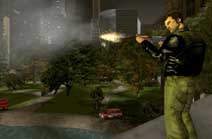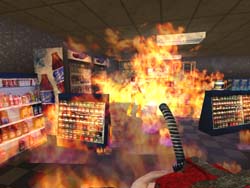
NEW YORK (CNN/Money) - Ready for the next round in the never-ending debate about whether computer and video games are too violent? Hope so, because it's about to heat up again.
It's a fight that pushes it way into society every six-to-12 months, often triggered by tragic events. id Software's 1993 action game "Doom" was targeted after the 1999 school shootings at Columbine High School. And the argument resurfaced briefly after 9/11 with the absurd notion that Microsoft's "Flight Simulator" inspired and helped train terrorists in the attacks on the World Trade Center.
This time, thankfully, it's not tragedy that will be causing the focus; it's the slew of new, even more graphic, action titles headed to retailers. The pot was first stirred a few months ago, with the runaway success of "Grand Theft Auto III" on the PlayStation 2. The game's focus on violent crime, adult language and sexual innuendo made it easily the most mature "M"-rated game on the market (an "M" rating on games is akin to an "R" rating for movies).
 |
|
| Grand Theft Auto III has relaunched the game/violence debate. |
It's PC games, though, that usually get singled out as the most violent – and it looks like a bumper crop's headed our way. In the pipeline right now are "Soldier of Fortune 2: Double Helix" (promising "gritty, intense action" and "real-world weaponry"), "Postal 2" (a sequel to the 1997 title that, in many ways, kicked off the gaming violence debate) and "Shoot to Kill: Colombian Crackdown" (putting you in the shoes of an undercover DEA agent running wild amongst the cartels).
They almost make the upcoming versions of "Doom" and "Unreal 2" look downright peaceful, don't they? But are these games truly harmful for the people who play them?
What always seems to be missing in the arguments about gaming violence is the ability for either side to see shades of gray. Opponents insist the gaming industry is warping the minds of children, teaching them to disregard human life and training them to aim and kill. Vocal hard core gamers insist they're easily able to distinguish between what's on the 17" monitor in front of them and the real world. (Of course, the rabid fanaticism of the majority of these gamers tends to overshadow any valid points they make.) Publishers and industry trade groups, meanwhile, typically fail to adequately defend themselves, often torn between trying to downplay the issue in hopes that it will go away and mollifying their investors.
The truth is that just as television and the movies have increased the level of sex and violence to keep viewers' interest, so has the gaming industry. And in doing so, they sometimes go too far. ("Columbian Crackdown" was accused of racial stereotyping less than 48 hours after it was announced. And the developers of "Postal 2" are gleefully talking to gaming sites about how visceral - and comical - their game will be.)
 |
|
| "Postal 2" |
Violence, even gratuitous violence, doesn't automatically make a title void of redeeming features, though. "GTA3," for example, has been universally reviewed as an absorbing, truly fun game (something that's pretty rare nowadays). And the adrenaline rush that comes from dodging virtual bullets and well-aimed shots is an undeniable visceral thrill.
As for warping the minds of children, gaming opponents tend to overlook a few key issues. First and foremost, the average gamer is not a child. He or she is 28 years old. In fact, adults purchase 90 percent of all titles on the market. And for all the hue and cry they cause, first-person shooters made up just 3.5 percent of the games on the market in 2001. (In fact, only 10 percent of all games sold were rated "M".)
Courts seem to be siding with the gaming industry, as well. Last month, a U.S. District Court judge dismissed a lawsuit claiming that video games (and movies) were to blame for the Columbine shootings, saying there was no way for the industry to reasonably foresee that their products would cause violent acts.
| |
 READ MORE
READ MORE
| |
| | |
| | |
|
Is that to say there's no violence that's tied directly to gaming? Absolutely not. In South Korea, players of the online game "Lineage" have been subjected to real world beatings after dispatching their opponents in the game. (Ironically, "Lineage" is a sword-and-sorcery role-playing game – not a first-person shooter.)
The point is that games are fantasy. If a player is unbalanced, perhaps he or she is more subject to suggestion from games or movies. Of course, they're also subject to suggestion from books, peers or the voices in their head. Are games getting more violent? Perhaps. But that's as much a reflection on society and culture as it is on the industry.

Morris is director of content development for CNN/Money. Click here to send him an e-mail.
|

